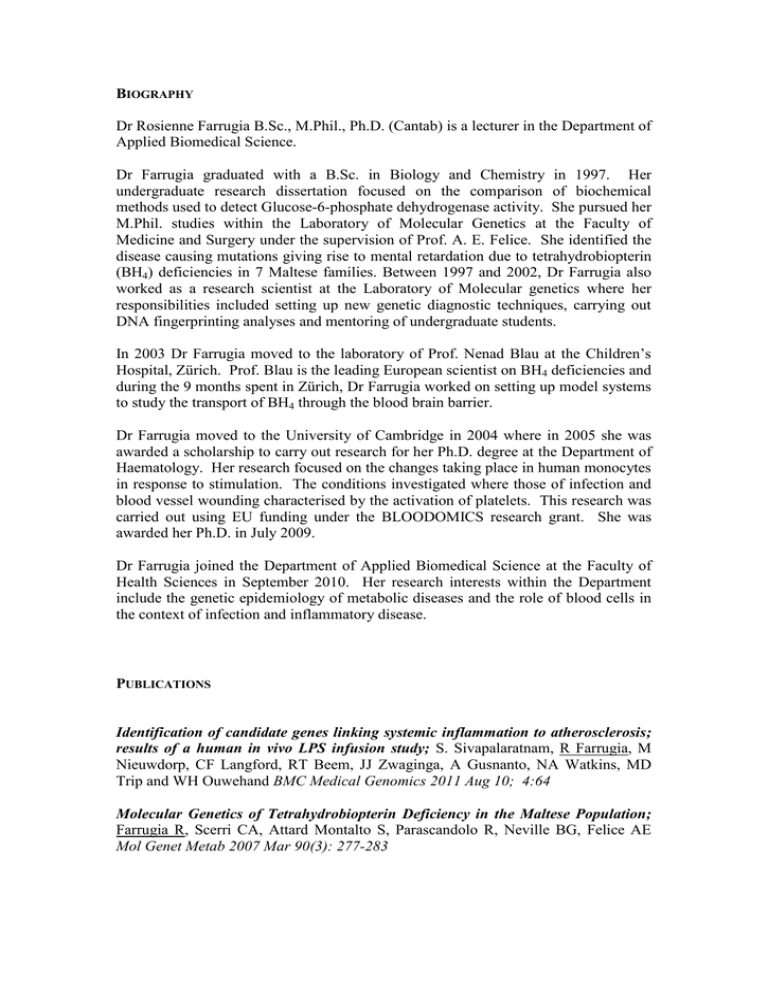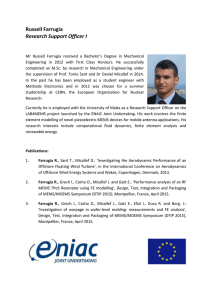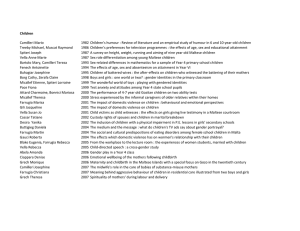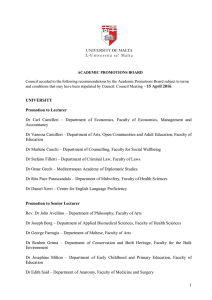B Dr Rosienne Farrugia B.Sc., M.Phil., Ph.D. (Cantab) is a lecturer... Applied Biomedical Science.
advertisement

BIOGRAPHY Dr Rosienne Farrugia B.Sc., M.Phil., Ph.D. (Cantab) is a lecturer in the Department of Applied Biomedical Science. Dr Farrugia graduated with a B.Sc. in Biology and Chemistry in 1997. Her undergraduate research dissertation focused on the comparison of biochemical methods used to detect Glucose-6-phosphate dehydrogenase activity. She pursued her M.Phil. studies within the Laboratory of Molecular Genetics at the Faculty of Medicine and Surgery under the supervision of Prof. A. E. Felice. She identified the disease causing mutations giving rise to mental retardation due to tetrahydrobiopterin (BH4) deficiencies in 7 Maltese families. Between 1997 and 2002, Dr Farrugia also worked as a research scientist at the Laboratory of Molecular genetics where her responsibilities included setting up new genetic diagnostic techniques, carrying out DNA fingerprinting analyses and mentoring of undergraduate students. In 2003 Dr Farrugia moved to the laboratory of Prof. Nenad Blau at the Children’s Hospital, Zürich. Prof. Blau is the leading European scientist on BH4 deficiencies and during the 9 months spent in Zürich, Dr Farrugia worked on setting up model systems to study the transport of BH4 through the blood brain barrier. Dr Farrugia moved to the University of Cambridge in 2004 where in 2005 she was awarded a scholarship to carry out research for her Ph.D. degree at the Department of Haematology. Her research focused on the changes taking place in human monocytes in response to stimulation. The conditions investigated where those of infection and blood vessel wounding characterised by the activation of platelets. This research was carried out using EU funding under the BLOODOMICS research grant. She was awarded her Ph.D. in July 2009. Dr Farrugia joined the Department of Applied Biomedical Science at the Faculty of Health Sciences in September 2010. Her research interests within the Department include the genetic epidemiology of metabolic diseases and the role of blood cells in the context of infection and inflammatory disease. PUBLICATIONS Identification of candidate genes linking systemic inflammation to atherosclerosis; results of a human in vivo LPS infusion study; S. Sivapalaratnam, R Farrugia, M Nieuwdorp, CF Langford, RT Beem, JJ Zwaginga, A Gusnanto, NA Watkins, MD Trip and WH Ouwehand BMC Medical Genomics 2011 Aug 10; 4:64 Molecular Genetics of Tetrahydrobiopterin Deficiency in the Maltese Population; Farrugia R, Scerri CA, Attard Montalto S, Parascandolo R, Neville BG, Felice AE Mol Genet Metab 2007 Mar 90(3): 277-283 Sepiapterin Reductase Deficiency: a congenital dopa-responsive motor and cognitive disorder; BGR Neville, R Parascandolo, R Farrugia and AE Felice Brain 2005 Oct 128 (10) 2291-2296 Analysing the Platelet Transcriptome; Macaulay I, Carr P, Farrugia R, Watkins NA Vox Sang 2004 Jul, 87; Sippl 2, 42-46 Genotype-phenotype correlation in dihydropteridine reductase deficiency; L de Sanctis, C Alliaudi, M Spada, R Farrugia, R Cerone, G Biasucci, C Meli, E Zammarchi, T Coskun, N Blau, A Ponzone and I Dianzani, J. Inherit. Metab. Dis. 23 (2000) 333-337.




